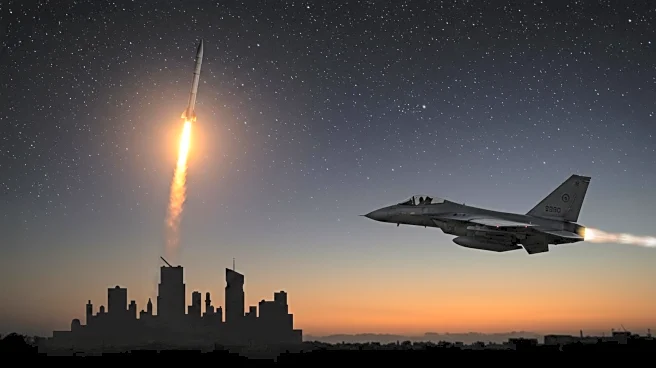What's Happening?
The Israeli air force conducted airstrikes on Yemen's capital, Sanaa, targeting military and energy facilities controlled by the Houthi rebels. This military action was in response to a recent missile attack by the Houthis, which included a cluster bomb aimed at Israel's Ben Gurion International Airport. The Israeli military deployed over ten jets to execute the strikes, which resulted in at least two fatalities and 35 injuries, as reported by the Houthi-run Ministry of Health. The airstrikes specifically targeted the Asar and Hizaz power plants, which are considered significant for military activities. The attack marks a significant escalation in the ongoing conflict, as it is the first time in two years that the Houthis have used such munitions against Israel.
Why It's Important?
This development underscores the escalating tensions in the Middle East, particularly involving Israel and the Iran-backed Houthi rebels. The use of cluster munitions by the Houthis represents a significant threat to Israel, complicating its defense strategies. The airstrikes by Israel highlight its commitment to neutralizing perceived threats from the Houthis, who have vowed to continue their military operations in support of Gaza until the conflict there ceases. This situation could further destabilize the region, affecting international relations and potentially drawing in other nations. The conflict also poses risks to global energy markets, given the strategic importance of Yemen's location near key shipping routes.
What's Next?
The situation is likely to remain tense, with potential for further military engagements between Israel and the Houthis. The international community may call for diplomatic interventions to prevent further escalation. The Houthis have indicated that their attacks will persist until the situation in Gaza is resolved, suggesting a prolonged period of instability. Israel may continue its military operations to deter further Houthi aggression, while regional and global powers may seek to mediate to prevent a broader conflict.
Beyond the Headlines
The use of cluster munitions by the Houthis raises significant ethical and legal concerns, as these weapons are banned under international law due to their indiscriminate nature and long-term danger to civilians. The conflict also highlights the complex geopolitical dynamics in the Middle East, involving various state and non-state actors with competing interests. The humanitarian impact on civilians in Yemen, already suffering from a prolonged civil war, is likely to worsen, prompting calls for increased international aid and intervention.









